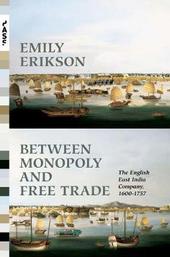
|
Between Monopoly and Free Trade: The English East India Company, 1600-1757
Hardback
Main Details
| Title |
Between Monopoly and Free Trade: The English East India Company, 1600-1757
|
| Authors and Contributors |
By (author) Emily Erikson
|
| Series | Princeton Analytical Sociology Series |
|---|
| Physical Properties |
| Format:Hardback | | Pages:272 | | Dimensions(mm): Height 235,Width 152 |
|
| Category/Genre | Asian and Middle Eastern history
International trade
Economic history |
|---|
| ISBN/Barcode |
9780691159065
|
| Classifications | Dewey:382.094205 |
|---|
| Audience | | Tertiary Education (US: College) | | Professional & Vocational | |
|---|
| Illustrations |
1 Maps
|
|
Publishing Details |
| Publisher |
Princeton University Press
|
| Imprint |
Princeton University Press
|
| Publication Date |
21 July 2014 |
| Publication Country |
United States
|
Description
The English East India Company was one of the most powerful and enduring organizations in history. Between Monopoly and Free Trade locates the source of that success in the innovative policy by which the Company's Court of Directors granted employees the right to pursue their own commercial interests while in the firm's employ. Exploring trade network dynamics, decision-making processes, and ports and organizational context, Emily Erikson demonstrates why the English East India Company was a dominant force in the expansion of trade between Europe and Asia, and she sheds light on the related problems of why England experienced rapid economic development and how the relationship between Europe and Asia shifted in the eighteenth and nineteenth centuries. Though the Company held a monopoly on English overseas trade to Asia, the Court of Directors extended the right to trade in Asia to their employees, creating an unusual situation in which employees worked both for themselves and for the Company as overseas merchants. Building on the organizational infrastructure of the Company and the sophisticated commercial institutions of the markets of the East, employees constructed a cohesive internal network of peer communications that directed English trading ships during their voyages. This network integrated Company operations, encouraged innovation, and increased the Company's flexibility, adaptability, and responsiveness to local circumstance. Between Monopoly and Free Trade highlights the dynamic potential of social networks in the early modern era.
Author Biography
Emily Erikson is an assistant professor in the department of sociology and the school of management (by courtesy) at Yale University, as well as a member of the Council of South Asian Studies.
ReviewsWinner of the 2016 Gaddis Smith International Book Prize, MacMillan Center for International and Area Studies at Yale University Winner of the 2016 James Coleman Award for Outstanding Book, Rationality and Society Section of the American Sociological Association Co-Winner of the 2015 Ralph Gomory Prize, Business History Conference Co-Winner of the 2015 Sharlin Memorial Award, Social Science History Association "It offers a fresh perspective on a key aspect of the Company's development and provides some impressive data to support the idea that private trade was the crucial dynamo driving Company innovation and expansion."--John McAleer, Journal of Maritime History "Between Monopoly and Free Trade is a spectacular debut that will mark Erikson as a luminary of historical sociology and earn her many intellectual followers... Though the sociologist familiar with, but not in thrall to, analytical sociology will be prone to approach the text with skepticism (as I was), he or she will soon be won over by the author's excellence in scholarship."--Isaac Ariail Reed, American Journal of Sociology
|